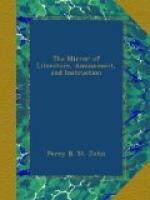In the consultations of Wesper we find related the history of a young man of family 22 years of age, who, having applied himself incessantly to intense mental exertion, was seized with a fit of insanity, in which fit he wounded several persons and killed his keeper. Catalepsy has been known to have been produced by great mental application. Fomelius gives us a remarkable instance of it. A man (says he) who passed whole nights in writing and studying, was suddenly attacked with a fit of catalepsy: all his limbs stiffened in the attitude he was in when the disease first seized him. He remained upon his seat, holding the pen in his hand, and with his eyes fixed on his paper, so that he was considered to be still at his studies, till being called to, and then shaken, he was found to be without motion or sensation.[4]
Many extraordinary instances are on record, of remarkable changes having been produced in birds by an affection of the animal passions. The following fact is related by Mr. Young, in the Edinburgh Geographical Journal. A blackbird had been frightened in her cage by a cat; when it was relieved, it was found lying on its back, quite wet with perspiration. The feathers fell off, and were renewed, but the new ones were perfectly white.
A similar phenomenon has been observed in the human species, who have been exposed to the effects of inordinate passion. Borrelli relates the case of a French gentleman, who was thrown into prison, and on whom fear operated so powerfully as to change his hair completely grey in the course of one night. Dr. Darwin ascribes this phenomenon to the torpor of the vessels, which circulates the fluids destined to nourish the hair. Nothing will, perhaps, demonstrate more fully the effects of moral causes in producing disease than the structural alterations discoverable in the bodies of those who have died whilst labouring under nostalgia, or the Swiss malady. This disease is considered peculiar to the Swiss, and is occasioned by a desire of revisiting their own country, and of witnessing again the scenes of their youth. This desire begins with melancholy sadness, love of solitude, silence, bodily weakness, &c. and is only cured by returning to their native country. Avenbrugger says, that in dissecting the bodies of those who have died in consequence of this disease, organic lesions of the heart generally are detected. A particular musical composition, supposed to be expressive of the happiness of the people, is in great vogue in Switzerland. If this tune or piece of music is played among the Swiss in any foreign country, it tends strongly to recall their affections for their native soil, and their desire of returning, and to induce the desire called nostalgia consequent on their disappointment. The effects of this musical composition is so powerful, that it is forbidden to be repeated in the French camp on pain of death, it having at one period had the effect of producing a mutiny among the Swiss soldiers, at that time in the employ of the French king.




